Sex and Bioware
Why we should all be grateful that BioWare cares about what it does.
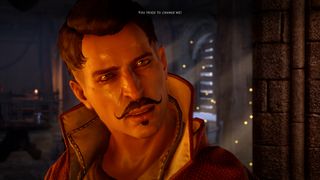
In this column, Richard Cobbett dug into the world of story and writing in games - some old, some new.
So, this is Dorian, and if you don't already know, he was one of the new companions in BioWare's Dragon Age Inquisition—a mage, a Tevinter, a man who knows how to rock a lion tamer's moustache, and the designated Team Snarky Guy for the titular Inquisition. Of course, what he's most known for is being BioWare's first 'fully gay' party character. That's not my words, by the way, but his writer, David Gaider. (Prior to this, party members have been either straight or bisexual, though there have been exclusive opportunities for both genders with supporting characters—notably Traynor and Cortez in Mass Effect 3. There was also Juhani in Knights of the Old Republic, but she's a complicated case due to both canon and cut content.)
I don't want to reduce the character down to just his sexuality, because as you'd expect from both Gaider and BioWare, it's not particularly what defines him—nationality, magic, friends, family all play a far larger role in his conversations and snarking, as you'd expect for a world where nobody particularly cares who you sleep with as long as it doesn't create a terrible god-baby. Sometimes not even then.
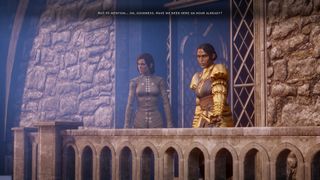
It's interesting to see the implementation though, and some of the details that Gaider makes a point of adding—not least that he's introduced with a young and admirable man, Felix, who he's clearly enamoured with on multiple personal levels, but is genuinely surprised at the suggestion that anything might have been going on between them—at both the idea, and that he'd be impolite enough to abuse his former master's hospitality so. At the same time though, his personal quest does go more or less exactly where you'd expect—his father who once tried to change him, and the attempted reconciliation between the two that probably deserves a tinkling bit of music and an "It Gets Better" type slogan appearing for good measure.
This feels both appropriate and unfortunate; appropriate because it's what's expected, and unfortunate for exactly that reason. It's a tricky problem for any writer, addressing the elephant in the room while still pointing out that there's other stuff in that room, and one that often goes wrong—the second X-Men film's infamously ham-fisted "Have you tried not being a mutant?" line springing to mind.
(It's also somewhat notable given the evolution of Traynor's story in Mass Effect 3, which the writer originally had following similar lines in focusing on her sexuality, before being given a polite dope-slap by colleagues and managers to not be so specific and reworking her story as a fish out of water tale that would ultimately lead to gaming's funniest joke about a toothbrush. Again, Citadel is fantastic.)
What matters though isn't really the execution, but the willingness to try. Bioware is a fascinating study into sexuality both for what they've gotten right, and what they've gotten wrong over the years. Mass Effect 2 for instance dropped a major clanger when BioWare co-founder Dr Ray Muzyka declaring Commander Shepard to be straight due to being 'a defined character with certain approaches and worldviews'. This isn't in itself an issue, and it's perfectly fine for any developer to give their characters whatever sexuality they choose. It did however jar severely with the multiple asari relationships on offer for a Shepherdess (and really, it'll take more than a codex entry for them to not be outright blue-skinned space babes) and the bonus romance with her PA, Kelly Chambers for an unattached Shepard at the end.
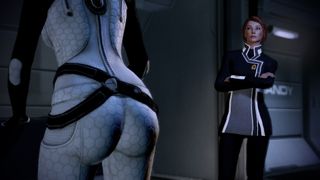
With each game though, BioWare has gone out of its way to Do Better, and not always by heading down the obvious path. Dragon Age 2 for instance infamously made all of its romanceable characters (the entire party save for Varric and Aveline) bisexual so that any player would be able to get with anyone they wanted. Dragon Age Inquisition and Mass Effect 3 reversed that approach, deciding that sexuality is an important part of the characters and that it can be as jarring for everyone you meet to be an option as to be politely refused. Some characters are still bisexual. Most now have their preferences, with Dragon Age expanding on gender to factor in species as well. Qunari especially seem limited in who they can give the horn.
PC Gamer Newsletter
Sign up to get the best content of the week, and great gaming deals, as picked by the editors.
This doesn't however mean that BioWare stepped back from the trickier issues. One of the new secondary characters was a transgender man in a qunari-run mercenary group, who hotly denies any suggestion of simply 'passing'. Like Dorian, the implementation of the scene is a little on-the-nose, mostly by having his boss make a point of adding that his people are cool with that so that there can be an unspoken "Don't say you're less tolerant than the qunari?" It works though, largely because the character in question gets plenty of screen time before that point to reinforce that they've neither earned what they got because or despite of this, but because they're tough. It's also interesting that this very PC scene is immediately followed by the entire group, male and female, cheerily singing a rowdy drinking song with lines like "No man can beat the Chargers, cause we'll hit you where it hurts. Unless you know a tavern with loose cards and looser skirts!" in a pretty clear statement of "And now, relax..." It's a game, not a sociology passion play.
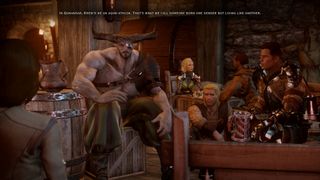
The fact that BioWare's push for inclusiveness and increasingly not defining characters by their sexuality first makes for better and more well-rounded games isn't the real reason we should be glad that they do it. The big advantage is that in doing it, it demonstrates to the rest of the world that it can be done. Lest we forget, BioWare has been taken to task by Fox News for simply showing a few seconds of alien buttocks on screen, been inundated with letters about LGBT content in its games, and even had to fight its own fans over expectations and entitlement.
This is not a small amount of pressure, and the path of least resistance is to crack, especially in the US where fears over sex trump those of violence any day of the week. Instead, BioWare repeatedly doubles down on diversity, which is all the more notable when put next to its capitulation over the Mass Effect 3 ending. That was simply a matter of spaceships and explosions. Whatever. This is something very close to its creative heart, and is treated as such.
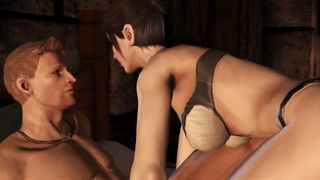
The result of this is that smaller, more vulnerable companies get to see directly that even if someone does make a flap, it doesn't actually mean a damn thing, as well as being able to point to an increasing range of high-profile examples of different character types, sexualities and storylines. By and large, things are only controversial once, provided they're wide enough spread to draw attention. Being big enough to have the spotlight and willing to take that hit for the industry as a whole, even if it is primarily because they think it's worth taking for their own games, makes BioWare a very important company. It's not that if they do it, everyone else has to do it, as some people fear. It's that if they do it, other people who want to do it can, or at least, have the tools to make a powerful argument in its favour to the powers that be.
It's for everyone's good. Really. The more taboos are broken, the more uncharted ground explored, the more exciting the possibilities we get to see. And before anyone starts throwing around letters like SJW, there's a side for you too. Where for instance was Fox News when, say, The Witcher 2 was doing graphic sex scenes like this one? Nowhere, that's where, because that battle was done, over, and deemed boring right from the second that the world did not in fact end. May BioWare sign itself up for many more such fights in the future, because they're in all our interests. In success, hurrah, fantastic. In stumbling, they show how much further we still have to go, and how even the best of intentions doesn't always pay off as you might think. Either way though, I'm grateful they keep trying, and setting an example worth following.
That said, if they ever do a Towers of Hanoi puzzle again, I'm nuking 'em from space.
Most Popular



